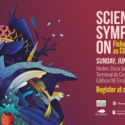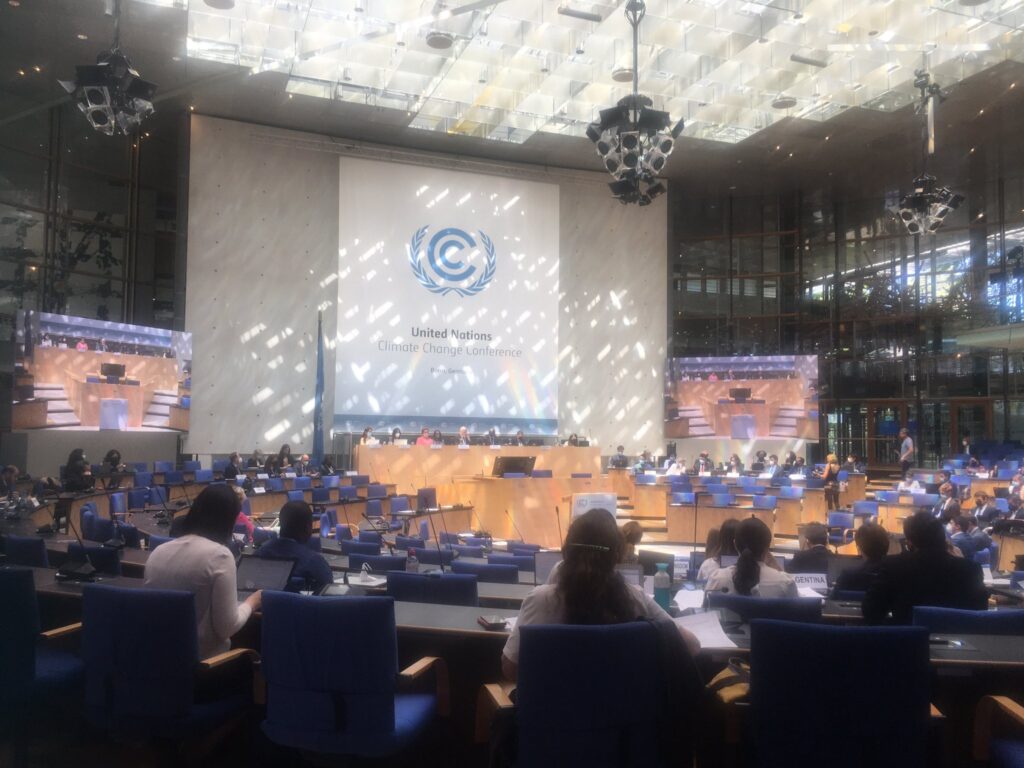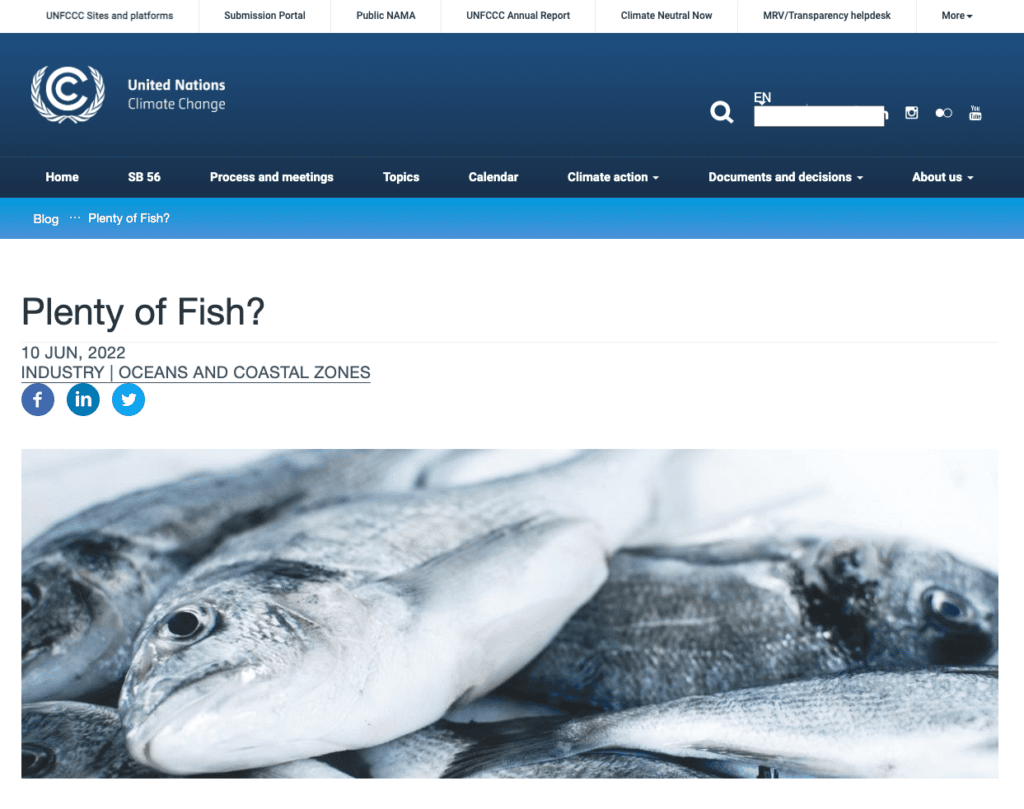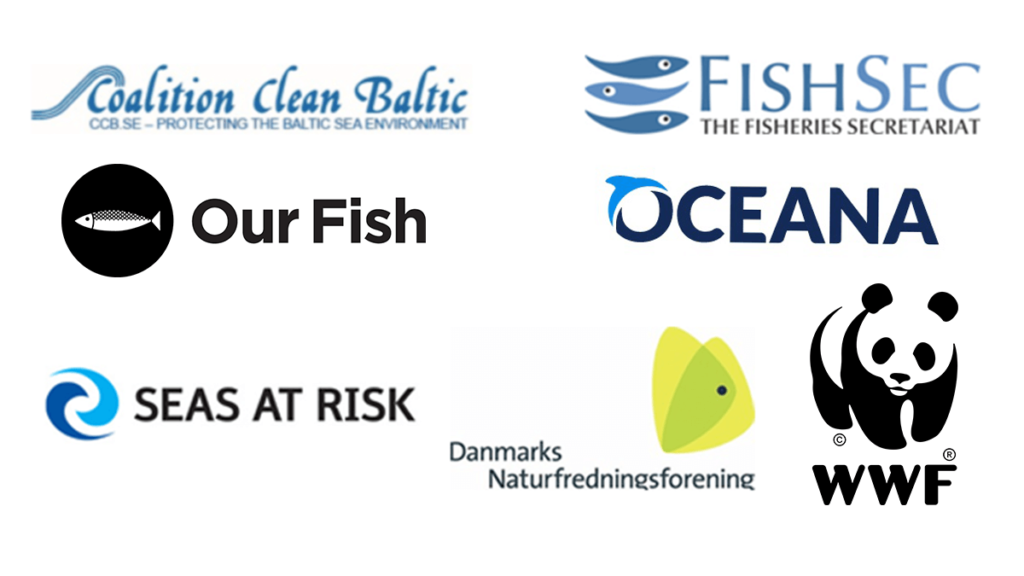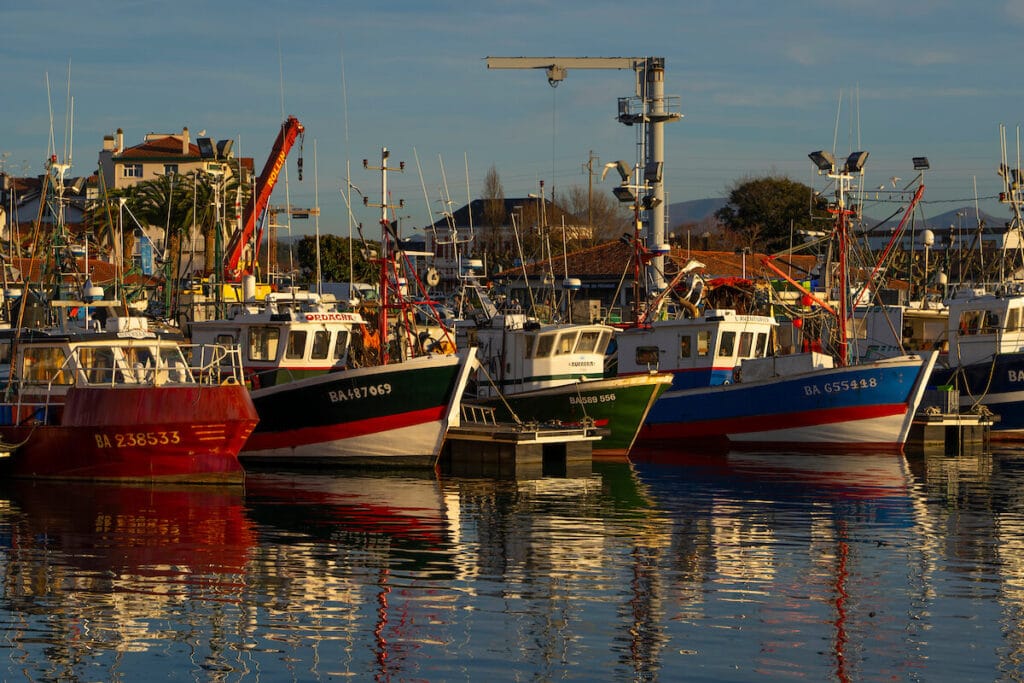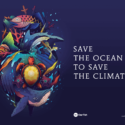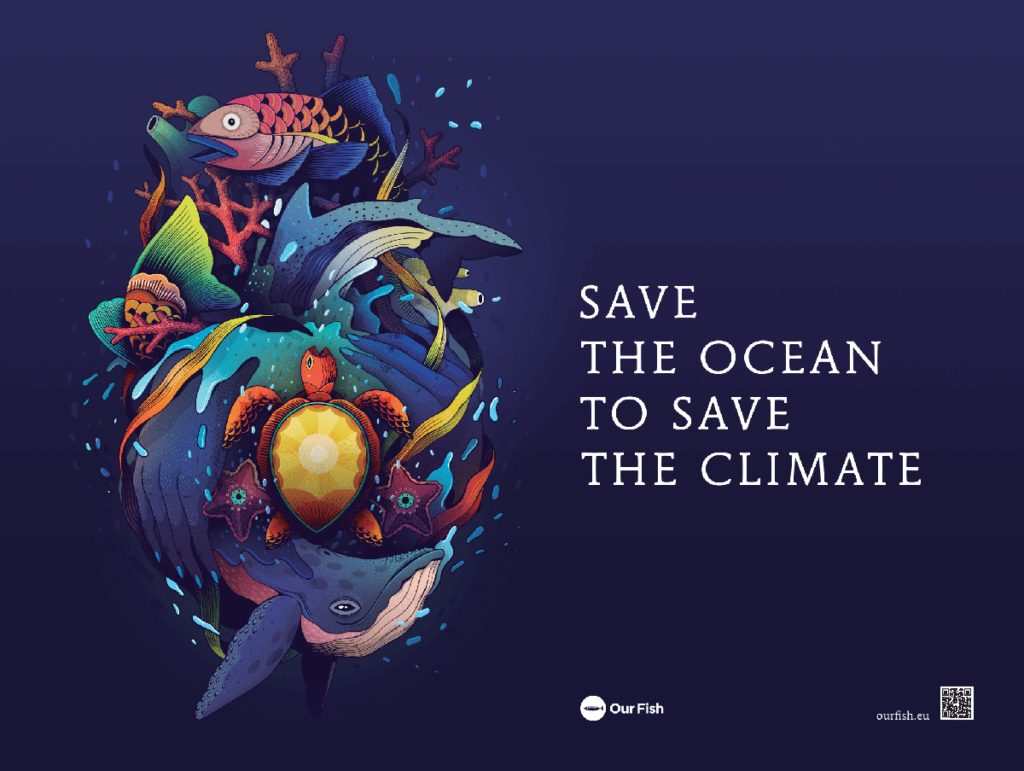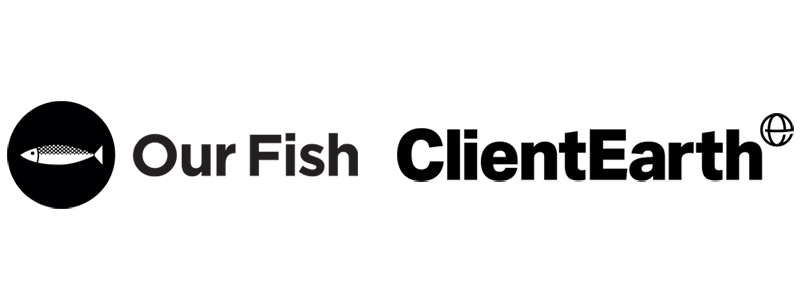Watch the video recording
Lisbon, 27 June 2022:- In a world first, marine scientists presented a groundbreaking series of papers (see below) that show how effective fisheries management can bolster the ocean’s ability to withstand the impacts of climate change during a symposium held on June 26th, ahead of the UN Ocean Conference in Lisbon, Portugal.
The event, Science Symposium: Fisheries Management as Climate Action, featured Professor and Director of the Fisheries Economics Research Unit, Institute for the Oceans and Fisheries, The University of British Columbia (UBC) Professor Rashid Sumaila of the Institute for the Oceans and Fisheries, who was joined by leading fisheries and marine scientists and economists from around the world to explore their findings on how the reduction of overfishing can increase the ability of life below water to withstand the impacts of climate change.
Speakers also included IPCC lead author and Professor and Director of UBC’s Institute for the Oceans and Fisheries, Dr William Cheung, Charlotte de Fontaubert, Global Lead for the Blue Economy at The World Bank, Dr Laura Blamey from CSIRO Oceans and Atmosphere, Australia and Professor Alex Rogers, Director of Science at REV Ocean and others.
The scientists presented the series of papers, recently published in Frontiers in Marine Science (How Overfishing Handicaps Resilience of Marine Resources Under Climate Change), which demonstrate in detail how both ending overfishing, and more responsible fisheries management, would significantly improve the health of the marine environment and biodiversity, and so the ocean’s capacity to mitigate the effects of climate change. Contact press@our.fish for more details on the papers.
“The work of these scientists demonstrates that fisheries management can play an important role in the dramatic and urgent action needed to address the climate and biodiversity crisis ”, said Rebecca Hubbard, Programme Director of Our Fish, which is hosting the Symposium, together with the Institute for the Oceans and Fisheries at the University of British Columbia, Sciaena, Environmental Action Germany (Deutsche Umwelthilfe) and the German Postcode Lottery. “We are increasingly learning of the importance of the ocean to planetary health, not least in regulating the climate”.
“Despite the ocean’s importance, we continue to put it under immense pressure from destructive- and over-fishing”, continued Hubbard. “For example, in the EU, over 40 percent of fish stocks are still being overfished, despite the Common Fisheries Policy’s requirement to end overfishing by 2020 at the latest. Maintaining this untenable situation is not only against the law, it is detrimental to the marine environment and dependent communities”.
One of the leading scientists presenting at the symposium, Professor Rashid Sumaila of the University of British Columbia’s Institute for the Ocean and Fisheries and the School of Public Policy and Global Affairs said, “we must immediately end the destruction of ocean life and restore its health; it is the world’s largest realm, housing an astonishing array of biodiversity that provides critical ecological functions, including mitigating the effects of climate change. Overfishing is like tackling climate change by burning fossil fuel.”
Contact press@our.fish for more details on the scientist’s papers.
See the full event program here.
The event was organised by University of British Columbia’s Institute for the Ocean and Fisheries and Our Fish and supported by the Dutch Postcode Lottery, Deutsche Umwelthilfe and Sciaena.
Speakers include:
- Dr Rashid Sumaila, Professor and Director of the Fisheries Economics Research Unit, Institute for the Oceans and Fisheries, The University of British Columbia
- Charlotte de Fontaubert, Global Lead for the Blue Economy at The World Bank
- Dr William Cheung, IPCC Lead Author and Professor and Director, Institute for the Oceans and Fisheries, The University of British Columbia
- Angela Martin, Research Fellow, Centre for Coastal Research, University of Agder, Norway
- Dr Laura Blamey, Quantitative Marine Ecologist, CSIRO Oceans and Atmosphere, Australia
- Prof. Alex Rogers, Director of Science at REV Ocean
- Erica Ferrer: NSF Graduate Student Researcher, UC San Diego at Scripps Institution of Oceanography, California, USA
- Sebastián Villasante, Professor, Department of Applied Economics, University of Santiago de Compostela, Spain
- Ibrahim Issifu, Postdoctoral Research Fellow, The Institute for the Oceans and Fisheries, University of British Columbia
- Ivonne Ortiz, Senior Research Scientist and Associate Director, Cooperative Institute for Climate, Ocean and Ecosystem Studies, University of Washington
-
Dr Laura G Elsler, Co-lead DEI, Early Career Ocean Professionals Program
-
Dr. Maartje Oostdijk, Research Associate, World Maritime University
- Francisco Guerreiro, Member of the European Parliament (Portugal)
Papers: How Overfishing Handicaps Resilience of Marine Resources Under Climate Change
This series of papers explores how the reduction of overfishing can increase the ability of life below water (LBW) to withstand the impacts of climate change. The authors focus on the potential of carbon sequestration and climate change mitigation through improved fisheries management (based on ecosystem considerations). Read more.
SUMMARIES (See full summaries below)
“End Overfishing and Increase the Resilience of the Ocean to Climate Change”
(U. Rashid Sumaila and Travis C. Tai)
The paper finds that ending overfishing would enable more effective conservation and sustainable use of marine fish and ecosystems, making it more resilient to climate change. View the paper.
“Governing open ocean and fish carbon: perspectives and opportunities”
(Maartje Oostdijk, Laura G. Elsler, Paulina Ramírez-Monsalve, Kirill Orach and Mary S. Wisz)
This paper concludes that the most promising path for the future governance of open ocean and fish carbon, including the mesopelagic zone where most of the World’s ocean carbon is actively transported by fish, may lie in international fisheries management and in current negotiations of a treaty for biodiversity conservation in the high seas (BBNJ). View the paper.
“Overfishing increases the carbon footprint of seafood production from small-scale fisheries”
(Erica M. Ferrer, Alfredo Giron-Nava and Octavio Aburto-Oropeza)
In this paper, the authors determine that efforts to end overfishing, rebuild fish stocks, and / or minimise intensive fishing practices will help to decrease the carbon emissions generated by fishing vessels burning fossil fuels. View the abstract.
“Impact of Ocean Warming, Overfishing and Mercury on European Fisheries: A Risk Assessment and Policy Solution Framework”
(Ibrahim Issifu, Juan José Alava, Vicky W. Y. Lam and U. Rashid Sumaila)
The paper demonstrates how anthropogenic-induced pressures such as mercury pollution from human-made sources may reduce the ability of fisheries and marine ecosystems to respond to present day climatic pressures. View the paper.
“Exploring Changes in Fishery Emissions and Organic Carbon Impacts Associated With a Recovering Stock”
(Angela Helen Martin, Erica M. Ferrer, Corallie A. Hunt, Katinka Bleeker and Sebastián Villasante)
Drawing on the recovery of European hake, the authors find that climate-based fisheries management must go beyond a target of maximum sustainable yield (MSY) to include climate-based objectives in an ecosystem approach to fisheries management. View the paper.
“Reforming International Fisheries Law Can Increase Blue Carbon Sequestration”
(Niels Krabbe, David Langlet, Andrea Belgrano and Sebastian Villasante)
The authors conclude that the maximum sustainable yield (MSY) should be complemented with a new management objective: maximum carbon sequestration (MCS) in order to make optimal use of the carbon sequestering features of marine organisms. View the paper.
“Resilience and Social Adaptation to Climate Change Impacts in Small-Scale Fisheries”
(Sebastián Villasante, Gonzalo Macho, Monalisa R. O. Silva, Priscila F. M. Lopes, Pablo Pita, Andrés Simón, José Carlos Mariño Balsa, Celia Olabarria, Elsa Vázquez and Nuria Calvo)
The paper explores the social impacts of climate change on Galician small-scale fisheries and concludes that although adaptive strategies have helped them to deal with impacts of climate change, several threats to the sustainability of shellfisheries remain. View the paper.
“Novel tools to guide fisheries management and ensure climate-resilience of fish stocks”
(Laura Blamey, Éva Plagányi, Alistair Hobday)
Uncertainties in the exact relationships between the environment and the resource have meant that environmental extremes and climate have been difficult to integrate directly into fisheries management. Using case studies from northern Australia, the authors show that a combination of novel modelling approaches (such as management strategy evaluation) and novel design of harvest strategies can be used to test robustness of fisheries management approaches to extreme environmental variability and help guide decision makers. (Presentation of various published work)
